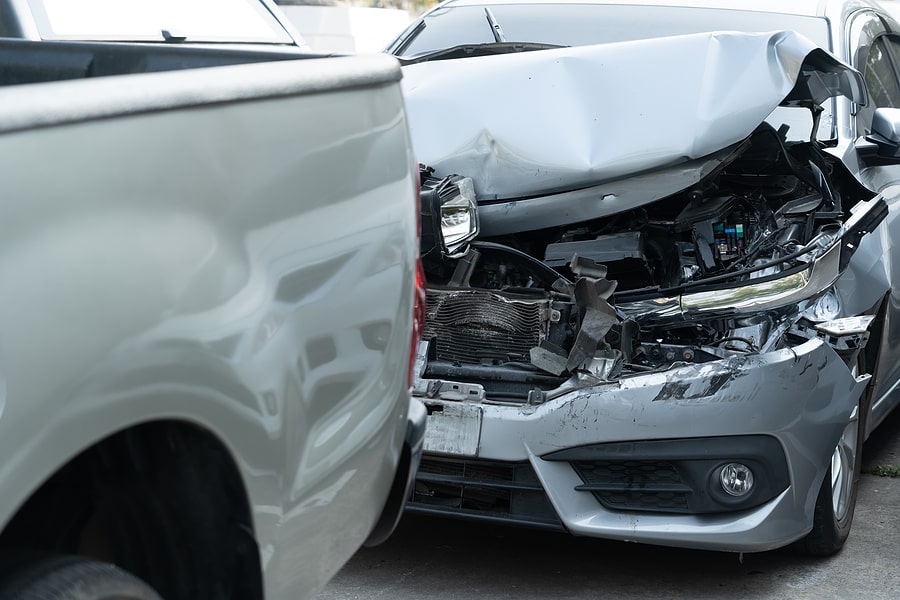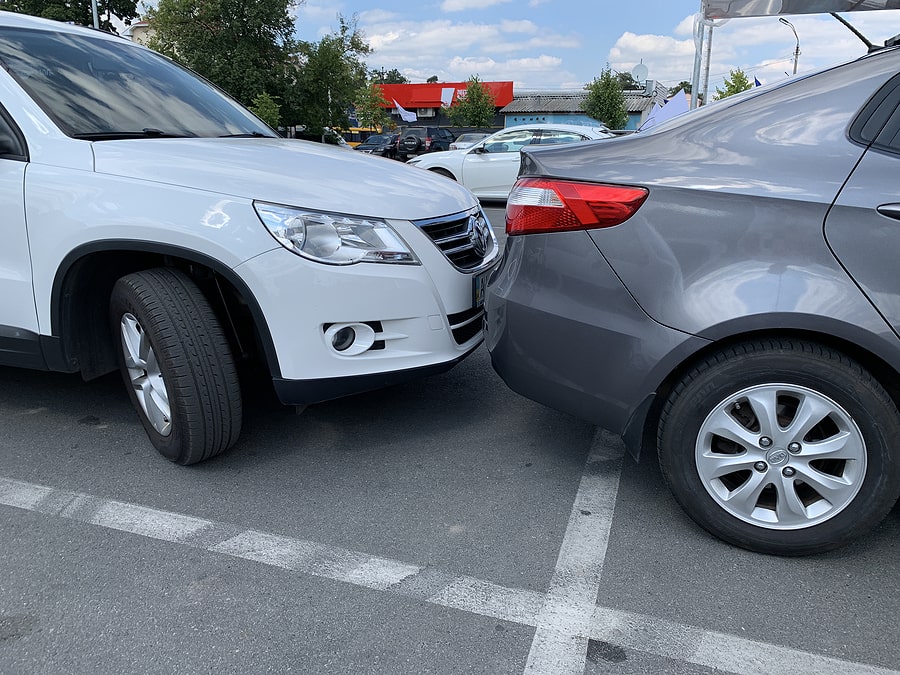After a car accident, thoughts tend to go immediately to the drivers of the vehicles. However, in reality, every person in a vehicle is vulnerable to injury. In fact, depending on the point of impact, it’s not unusual for a passenger to suffer injuries more severe than the driver during an accident.
Many passengers hesitate to explore their options after a car crash. Even if you were riding in a friend or family member’s car when their negligence caused an accident, you still have rights.
Read on to understand the risks that car accidents pose to passengers — and the damages we can help them recover after an accident.
The Pain of Injury
The extent of a passenger’s injuries depends on multiple factors, like the force of the accident, where the impact occurred, whether or not the passenger wore a seat belt, and if the other safety mechanisms in the vehicle worked properly.
The following injuries are common after a car accident:
- Brain damage: Many car accident passengers strike their heads on hard surfaces, like the dashboard or window. One possible result of this impact is a traumatic brain injury (TBI). A TBI can cause irreversible brain damage that disrupts the brain’s normal functioning. Victims often find themselves left with physical or cognitive disabilities, in a coma, or in a vegetative state.
- Head injuries: If your head makes contact with any part of the car, a TBI is not the only possible outcome. A passenger might suffer from a concussion, a skull fracture, or lacerations on the head that could require stitches. Head injuries are less likely when the occupant is wearing a seatbelt.
- Spinal injuries: The spinal cord is the all-important bundle of nerves that allows the brain to communicate with the body. Any injury to the spinal cord has the potential to forever alter the injured passenger’s way of life. If the spinal cord is severed or fractured, the victim may experience symptoms ranging from numbness to muscle weakness to paralysis. The victim may lose the ability to control certain bodily functions.
- Neck and back injuries: The trunk of the body often takes a beating in a car accident, resulting in injuries to the neck and back. You might’ve heard of “whiplash” before, but these sorts of injuries often result in lifelong pain for the victim, requiring extensive physical therapy or rehabilitation. Victims may be unable to return to activities they once enjoyed.
- Internal injuries: Any blow or impact to the body has the potential to cause internal damage to organs, including the heart, lungs, kidney, and liver. Damage to internal organs can be incredibly dangerous, but it’s also difficult to diagnose. Symptoms will vary depending on which organ was injured.
- Broken bones and fractures: Some broken bones heal quickly, but others have serious ramifications. Broken bones may require surgery and long-term rehabilitation.
- Dental and facial injuries: A passenger’s face might strike a hard surface in the accident, such as the dashboard or window. Any impact to the face has the potential to cause damage to facial bones and teeth. Common injuries include cracked or chipped teeth or damage to the jaw. Depending on the extent of the damage, a victim may also require facial reconstructive surgery.
- Cuts, bruises, and sprains: While they seem less severe, these injuries can still seriously disrupt your way of life. Cuts may become infected, and sprains can limit your ability to perform regular tasks and impede your range of motion. If you work a physical job where you routinely perform manual labor, you may be unable to complete your tasks.
There’s no doubt that passengers are often left to deal with painful and life-altering injuries after a car accident. You deserve full recovery and full compensation for these injuries!
Who Is Responsible?
It’s simple: any party that acted negligently and caused an accident is responsible for the resulting injuries of any passenger.
Passengers rarely bear any responsibility for an accident, since they were not involved in driving either of the vehicles. The following parties may be held accountable:
- Drivers: The first place to look for potential responsibility and liability are the drivers of each car in the accident, including the driver of the car in which you were riding. Drivers are responsible for avoiding negligent acts that may cause injury to their passengers and fellow motorists. Any recklessness or failure to exercise reasonable caution is evidence of negligence. The most straightforward evidence is behavior that violates any traffic law or regulation, such as speeding, failing to heed traffic signals, driving under the influence, and distracted driving.
- Vehicle manufacturer: If a faulty auto part or vehicle malfunction caused the accident or hurt you, the company responsible for that malfunction will be held liable. Vehicle manufacturers are required to sufficiently test their equipment and ensure proper functioning. Even if a malfunction did not cause the accident, it may still have contributed to your injuries. For example, if an airbag fails to deploy, a passenger can be more seriously injured during an accident.
- Local government: Your local government is responsible for maintaining the roads and ensuring traffic signals work appropriately. If a government entity failed to uphold these responsibilities and caused the accident, that entity is responsible. Due to statutory protections and burdensome process requirements, it may be challenging to pursue recovery from a governmental entity, but an experienced car accident attorney can help.
No matter which party is responsible, you’re likely going to be dealing with the at-fault party’s insurance provider. Once you have established liability, you will need to file a third-party injury claim with the at-fault driver’s insurance company. It is important to discuss this process with your lawyer, because you may need to file a claim with multiple insurance companies. Many people expect this process to be complicated and frustrating, but with the help of a personal injury lawyer by your side, it doesn’t have to be.
Focus on Evidence
Everyone reacts differently in the aftermath of a car accident. As a passenger, it’s common to simply count your blessings and “check out” of the entire ordeal. You’re tempted to step back and let the driver take the lead, leaving them to deal with their car’s damage and any insurance issues.
However, if you were at all injured in the accident, you need to properly document the accident. Your own personal recovery will depend on this evidence.
The insurance company is not likely to automatically approve your claim for recovery. Instead, they will require strong evidence that the driver covered by the policy was at fault.
The most important thing to do after an accident is to seek medical care. Next, once you have confirmed your injuries are manageable, be sure to obtain a police report. The police report is a crucial piece of evidence because it will document the scene of the accident, collect witness statements and information, and make note of any citations issued to drivers for failure to comply with traffic laws. If the drivers are concerned about their liability, they might hesitate to call the police to the scene. However, even if they’re your friend, you should insist on calling the police so all evidence can be properly gathered and documented.
After the accident, make sure you keep track of all documents associated with the accident and your medical care. These documents are essential in understanding the scope of your damages as you work with your lawyer.
How Much Compensation Should I Seek?
If your friend was driving when you got into a car accident, don’t feel like you’re “attacking” them if you choose to seek compensation. The defendant — and their insurance company! — is responsible for all injuries you suffered from the accident.
The most obvious expenses are the medical costs associated with your injuries, but a car accident often triggers a domino effect that can interrupt all areas of a victim’s life. The amount any injured passenger can recover will depend on the extent of their injuries and suffering, as well as the strength of evidence against the defendant.
Don’t let anything slip through the cracks. Work closely with your attorney to analyze all of the damages that you have suffered, including the following:
- Medical expenses: Include all medical expenses, including doctors’ visits, hospital stays, prescription medicine, and emergency transportation. If your injuries require long-term care, like physical therapy or an in-home nurse, your personal injury attorney can consult with medical experts to estimate your future expenses and include them in your claim.
- Lost income: Many injuries require the victim to miss work, work a reduced schedule, or perform lighter work, resulting in lost or reduced wages. The defendant and their insurance provider are liable for these losses. If your injuries affect your ability to work at the same level as before your injuries, discuss the possibility of seeking lost future earning potential with your lawyer. An economic expert can help calculate these damages.
- Property damage: This category doesn’t just apply to auto repair. If any of your personal property was damaged in the accident, the defendant is responsible for repair or replacement.
- Emotional distress: A car accident is a traumatic event. Many accident victims suffer from emotional distress, including anxiety, depression, or post-traumatic stress disorder (PTSD)—either from the trauma associated with the accident or the disruption caused by the injuries. You deserve compensation for this distress.
- Loss of enjoyment: Many injuries limit injured individuals’ abilities to perform activities that were previously a meaningful part of their lives. If you can’t participate in an activity that is important to you because of your injuries, be honest and include this loss of enjoyment in your damages demand.
- Punitive/exemplary damages: Punitive damages do not compensate plaintiffs for their injuries. Rather, punitive damages are a fiscal means of punishing defendants for particularly bad behavior. The requirements for recovering punitive damages vary from state-to-state, and many states cap the amount of punitive damages that a jury may award.
In the aftermath of your accident, be sure not to take any action that would put your recovery at risk. One common mistake is posting on social media. It may surprise you, but insurance companies will snoop for any scrap of evidence that they can use to counter your claims.
Imagine the following scenario: you injured your leg in a car accident and you are claiming damages for your inability to perform your job that requires you to stand for hours at a time. You then post a photo on Instagram of you with concert tickets in hand, with the caption “stood in line for these for hours!” While there could be a rational explanation (perhaps you sat down while in line or someone held your place), the defendant will attempt to use posts like this against you and claim you are exaggerating your injuries.
The safest thing to do is to avoid any social media posting until your case concludes. Even if your social media accounts are private, the defendant can request printouts during the discovery period of the case.
Additionally, don’t be surprised if the defendant’s insurance company approaches you with a settlement offer early in the process. It can be tempting to accept an early settlement offer to resolve the matter quickly and get money in your pocket, especially when you’re coping with bills and injuries. Unfortunately, most early settlement offers significantly under-compensate the plaintiff. An attorney can help you evaluate the offer against the full scope of your injuries and the strength of the evidence against the defendant. We know what you deserve, and we will fight to get it.
Passenger Injury Statistics
Motor vehicle injuries are responsible for more than 2.3 million emergency room visits every year. Last year, there were an estimated 36,120 fatalities in motor vehicle accidents in the United States. The Bureau of Transportation Statistics found that in one five-year period, nearly 70% of motor vehicle crash fatalities were occupants, not drivers.
One particularly vulnerable group of passengers are children. In the most recent year for which statistics are available, 675 children under the age of 12 died in motor vehicle crashes in the United States, and 116,000 more were injured. Motor vehicle accidents are a leading cause of death in children, with an average of three children killed every day in traffic accidents in the United States.
These grim facts paint a clear picture: passengers are just as susceptible to injury as vehicle drivers, and injuries to passengers may prove even more severe and traumatic.
Work With an Experienced Attorney
One of the most critical steps you can take to help maximize your final compensation is to contact an experienced attorney immediately after the accident. Look for a law firm with a client-first mentality, one who understands each client’s circumstances and goals are different.
You deserve a team that makes communication a priority, committed to responding promptly to any email or call. You deserve a team with the knowledge, resources, and experience to handle your car accident case — and the satisfied clients to prove it. You deserve Stewart J Guss, Personal Injury Attorneys.





